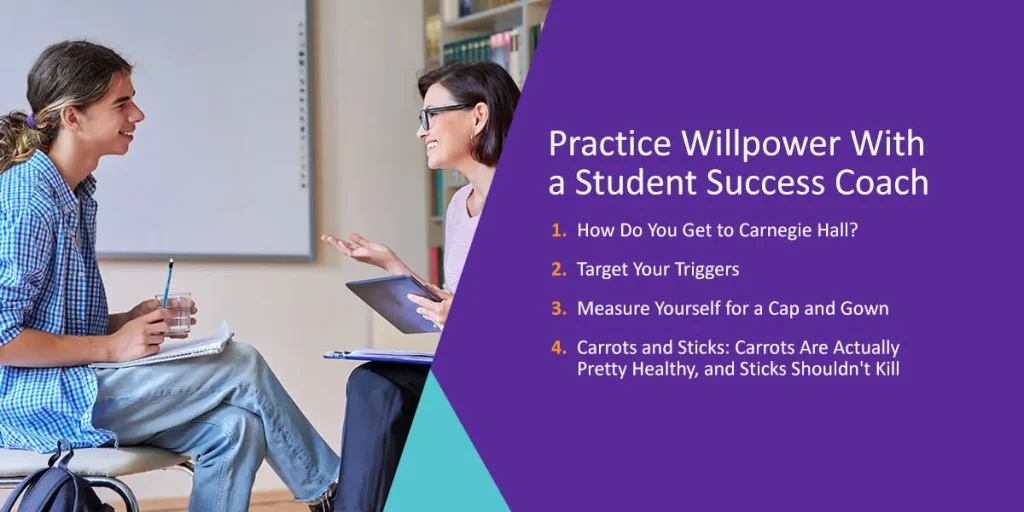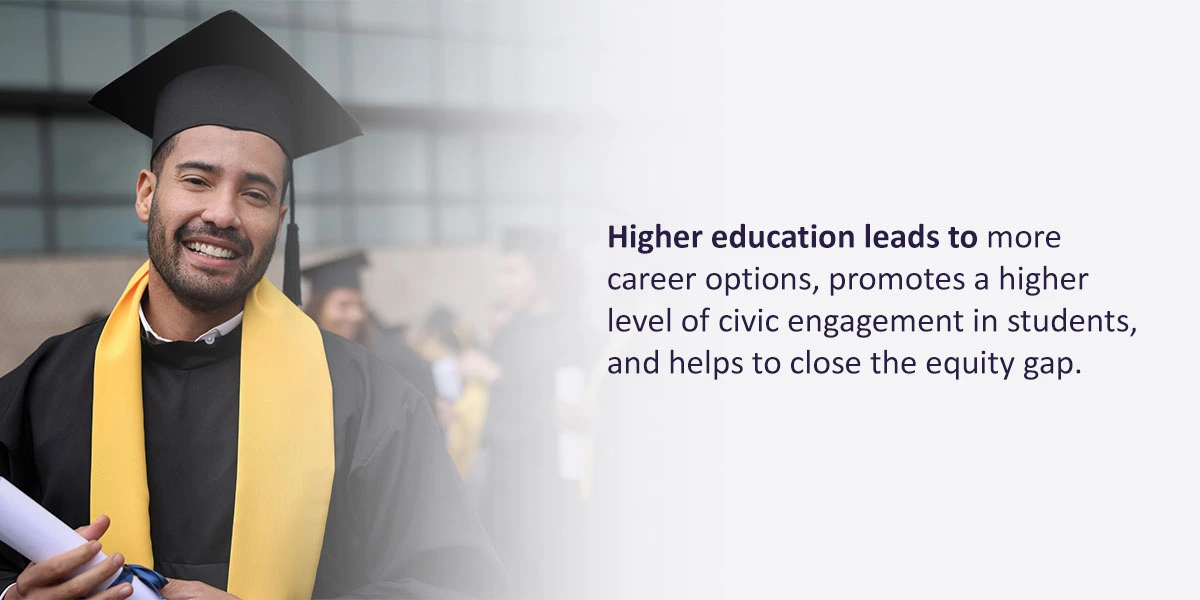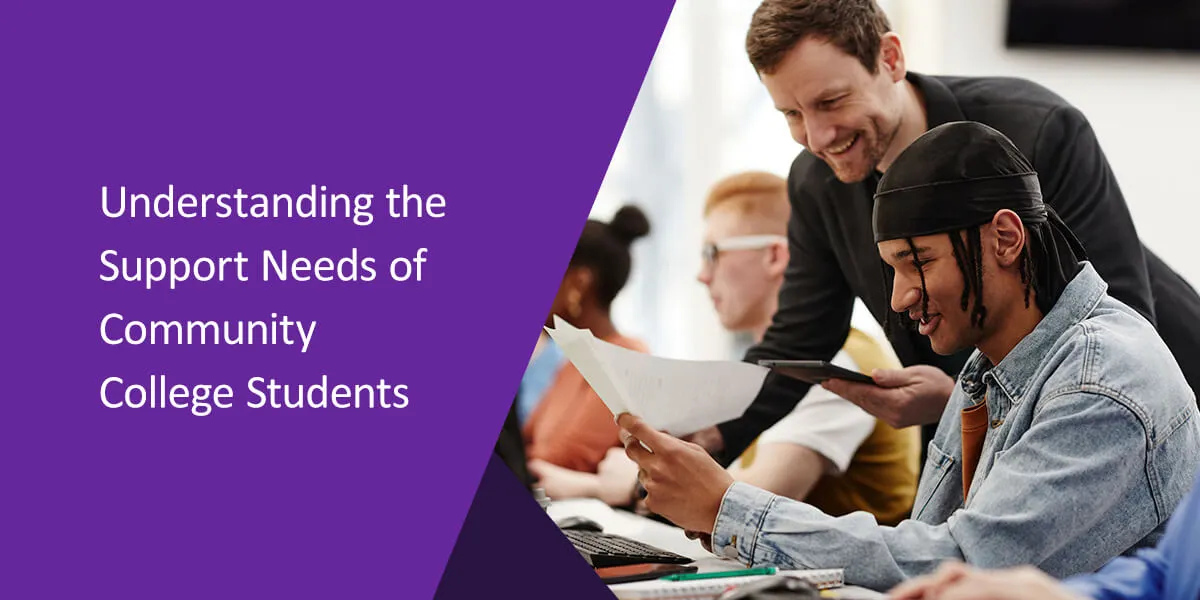




All of us have, at one time or another, struggled with that unfortunate necessity: willpower. At times, we succeed in avoiding temptation — I ordered the side salad instead of the fries! — or doing what we hate the most — Hello, TurboTax! Sometimes, we fall short — I’m just going to open up TurboTax here and…wait…did my sister post new, adorable pics of my nephew on Facebook? I’m gonna check those out for just a second.
For college students, especially those who find themselves on academic probation or warning, a lack of self-control is often a major, if not the primary, cause of their struggles in school. Academically, my students often have difficulty sticking to a study schedule, starting long-term assignments early, turning in assignments on time, and even going to class.
So how do you teach willpower? How can a success coach help create an environment in which students can more easily build up their ability to resist temptation and accomplish difficult or undesirable tasks?
As anyone who has been to college can attest, students need willpower outside the classroom too. After all, pizzerias don’t flock within delivery distance of every university in America because of the astronomically high earning power of college students. Many of my students have difficulty eating healthfully and exercising, which can negatively affect their physical and mental health and their ability to focus and perform academically.
Success coaching focuses on the less spoken-of nuances that can mean the difference between academic success and failure. The role of a success coach is more complex than simply helping with academic preparation. Instead, a student success coach is responsible for all aspects of student success, and willpower is vital.
In short, as a student success coach, I can attest to the importance of success coaching in areas like willpower. Honing skills as fundamental as making decisions with a goal in mind, regardless of short-term temptations, is critical to the student experience.

Over the years, I’ve pinned down some common methods that help the majority of my students, including the following:
Practice, practice, practice! Willpower takes practice like any other skill, from mental math to shooting a free throw to meditation. The good news is that practicing willpower in any situation can help you improve when it really counts. Studies have shown that regularly making small decisions that require self-control — taking the stairs instead of the elevator, making one’s bed every morning, forgoing swearing when someone cuts you off in traffic — grows one’s capacity for self-control in all situations.
Anything that causes you to override an impulse to either indulge that second piece of pie or avoid that looming email inbox can be good practice for when you are confronted with challenging situations.
I always ask my students to list the things they find most difficult to either do or avoid. I think it’s important to make the distinction between the two. It may be difficult for me to avoid turning on the TV when I really should be studying, but succeeding in not turning it on doesn’t necessarily mean I have opened a textbook.
There are some things we really want to do but shouldn’t and others we should do but really don’t want to. Therefore, I ask my students to write down both types of trigger situations as well as to note any overlap or interrelation between the two. If I always seem to avoid working on a paper by futzing around on the internet, then perhaps I should work on the paper somewhere that doesn’t have Wi-Fi — if I can find one — or, at least, turn off all notifications during the set period I have allotted for work.
Many of my students are the first in their families to go to college, and so one of the things I ask them to do in situations in which they need to use a little willpower is to literally visualize the end goal — graduation day.
Who is there watching you walk across the stage? Maybe it is your mom, dad, grandma, or little brother who will see your success and realize that their dreams might be achievable too. How do they look? How do you feel in your cap and gown as you wave to them from your seat among all the other graduates?
Now, every time you are tempted to go to that impromptu dorm party when you really should be studying, even if you tell yourself you’ll only go for an hour before getting back to the books (a hilarious lie we have all told ourselves at some point in our lives), remind yourself of that image. You are closer to it every minute you stay above water.
This doesn’t mean that any time spent partying or relaxing with friends is wrong or wasted. After all, all work and no play makes Jack a dull boy, and probably a pretty sad human being. It just means that, if spending two hours right now on macroeconomics will get you closer to the exhilaration of walking across the stage at graduation, the shouts from all those who have supported you and cheered you on ringing through the air, open that economics book and remind yourself that there will be another party tomorrow.
We can all be pretty hard on ourselves. We fail, and instead of getting back in the game, we tell ourselves, “You are so stupid for failing! No one else is failing, and if you were worth a darn you wouldn’t either!” Each of us has a different mantra that our inner critic repeats to us over and over, but we all have some version of it.
With my students, I remind them that it doesn’t do much good to beat yourself up when you fall off the horse. They all have failed to some degree already, and too much self-criticism can become demoralizing and eventually defeatist. On the other hand, if you acknowledge your mistake and give yourself a kindly lift back into the saddle, you will be more apt to commit to continuing the ride.
Likewise, rewarding yourself for small victories can be healthy and motivating if you don’t let a little reward send you into full temptation gratification. “If I finish three pages, I’ll go get a mocha at the coffee shop” can do a lot to boost energy and morale…as long as the mocha doesn’t lead you to, Augustus Gloop-style, fall headfirst into a river of chocolate.
Student success begins with the basics, and we use willpower every day. Something as simple as getting up and going to work when we would rather lie in bed and watch a movie is a keystone skill for a successful adulthood, one that’s best learned early. Ensure your success and hone your willpower with the following tips and tricks:
As with everything, it’s a process. Willpower is a long game. As a success coach, I teach my students that every setback is one small step forward — because learning is growth — and every victory is one giant leap toward achieving an even more fulfilling life.
Susan Marion is the Coordinator for Success Coaches at Tiffin University, in Tiffin, Ohio. She was instrumental in starting success coaching at the institution in 2007. The program now has fifteen part-time success coaches and supports almost one hundred students who are at risk academically.

Watermark is driven by people, and we turn insights into actions to drive student success. We have provided consistent and proactive innovations to higher education institutions so that you can drive change and connect with your students to ensure their success.
Our software solutions let you do more than enter data into a spreadsheet. Instead, you can make a difference that is felt. With Watermark Student Success & Engagement, you can improve student outcomes and take the necessary steps to keep underserved students engaged and on track to success. We invite you to browse our solutions and see how we can help you drive student success at your institution. Alternatively, request a demo today and experience the difference for yourself.





























































































































































































































































































































































































